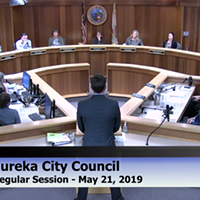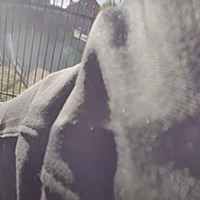'A Comedy of Errors'
How misinformation 'plagued' Eureka's bid to market itself
By Thadeus Greenson [email protected] @ThadeusGreenson[
{
"name": "Top Stories Video Pair",
"insertPoint": "7",
"component": "17087298",
"parentWrapperClass": "fdn-ads-inline-content-block",
"requiredCountToDisplay": "1"
}
]
When the city of Eureka took the bold step in February of putting out a request for proposals for a lucrative marketing contract — one that for decades had been given to a single organization — the request itself outlined a bold vision.
Referencing the council's 2018 strategic visioning session, the request noted that the council had identified public perception as one of the city's biggest challenges, noting there is a "negative public narrative" and the "phenomenon that 'what you focus on is what you see.'"
"These are serious challenges in Eureka, where the local media, local residents, members of the business community and residents of nearby communities too often focus deeply and exclusively on Eureka's darkest corners," the RFP states. "While things are getting better in this regard over the past year, the city needs help with shinning (sic) a spotlight on Eureka's assets (and enhancing Eureka's assets) so that we all 'focus on' and 'see' a better Eureka."
The city's Community Development Department was making clear that this RFP — looking to find someone to enter into a $370,000 annual contract to market the city — was a vast departure in approach. While the Eureka-Humboldt Visitors Bureau had made the redwoods the cornerstone of its marketing campaigns for decades, the city was now looking to bet on itself, making sure Eureka was the centerpiece of its funded marketing efforts. But even more, the city was looking for a process and a firm that would make Eurekans and Humboldters see the city in a new light, make them focus on the positive.
Four months later, it can be fairly said that the process of awarding that contract has done anything but improve the city's image. Instead of being a celebration of Eureka and a vetting of ideas on how it can turn its best face toward the world, the process has been dominated by controversy and "plagued by misinformation," as the City Manager's Office put it in a June 3 press release. Even before a Journal inquiry led City Attorney Bob Black to determine city staff had provided misinformation to the public and the council, and the process had potentially caused "significant exposure to litigation," some in the local marketing and tourism industries were already questioning if the procedure for handling the proposals was above board.
Then, after being briefed in closed session by Black as the Journal went to press June 4, the council voted to go against what staff had strongly recommended just a couple of weeks earlier, disqualifying a local organization's proposal and directing the city manager to negotiate the contract with a national firm based in Virginia. Both decisions will come back before the council in the form of resolutions June 18.
During a tense Eureka City Council meeting May 21, members of the council lamented that what they deemed a flawed process used to select finalists for the marketing contract had broken the public's trust.
Things have since gone from bad to worse amid new revelations, including that staff repeatedly and materially misrepresented key facts about how the process played out.
The council's June 4 closed session votes bring a jarring end to the problematic request for proposal process that just weeks earlier had led to staff recommending the council award the marketing contract to Humboldt Made, which already runs the Eureka Visitors Center, over the nationally acclaimed Virginia firm Eddy Alexander. The council had already pumped the brakes May 21, opting to hold off on awarding the contract and to instead conduct another round of interviews with the two finalists, this time with marketing experts and a couple council members on the interview panel.
But after last month's vote, the Journal learned that staff had repeatedly provided inaccurate information to the public — and the council at the May 21 meeting — about problems with Humboldt Made's initial proposal submittal and that of another firm that didn't make the final cut. The problems were in fact so substantial that City Manager Greg Sparks said prior to the June 4 meeting that, knowing what he'd learned, he felt Humboldt Made's proposal should have been rejected and not considered. He quickly added that he didn't want to get out in front of the city attorney's closed session presentation on the findings of an internal review of the matter and legal ramifications for the city.
At the heart of the matter is the question of whether Humboldt Made submitted its proposal complete and on time, and, if not, whether that "irregularity" was something that should be considered nonmaterial — the kind of thing that could be waived while maintaining a fair process — or substantive enough that it gave the firm a competitive advantage.
The city's request for proposals asked interested firms to submit both a digital copy and 10 paper copies of their proposals by the close of business April 5 and warned "any proposals received by the city after the hour and date shall be rejected and returned unopened." The RFP document also includes a disclaimer that the city "further reserves the right at any time and for any reason to ... alter this RFP if the conditions so dictate."
The first hint that anything unusual might have occurred with Humboldt Made's proposal came in a May 14 story by the Lost Coast Outpost, which reported on a string of text messages between Eureka Community Development Services Director Rob Holmlund and Humboldt Made Executive Director Alanna Powell that the website had obtained through a California Public Records Request. (The texts actually came as part of three requests submitted to the city by two anonymous email addresses in early April that requested a host of documents, including texts and emails associated with Powell and Holmlund. It's unclear how the website learned of the requests.)
As first reported by the Outpost, on Sunday, April 7 — two days after the city's deadline for marketing proposals — Powell texted Holmlund to say that the firm's "final version of the proposal was unfortunately not the copy that was sent to the printer." It seems, due to a staff error, the firm had inadvertently printed a rough draft and submitted it to the city. In his reply, Holmlund asked if Humboldt Made submitted the correct digital version and Powell told him she was having a staff member check. The exchange is brief but Holmlund does not indicate the submittal error might be disqualifying, and Powell never responds to confirm whether staff submitted the correct digital version.
When asked about this exchange by the Outpost, Holmlund, Sparks and Powell all reportedly said Humboldt Made had submitted the correct draft electronically by deadline so the city deemed the application complete — despite the error — and allowed Humboldt Made to resubmit paper copies on Monday, April 8.
Councilmember Kim Bergel questioned Holmlund about this during the May 21 meeting.
"When the proposals were submitted, I was working on a Sunday on the zoning code and got a text from the director of the visitor's center," Holmlund said. "It said, 'One of my staff submitted the wrong copy of the proposal.' I asked (Development Services Deputy Director Lane Millar) to look into it and there was a duplicate page so I said, 'Just resubmit.' And so I think Lane talked to the city manager as well. So they resubmitted, and so did another firm ..."
Bergel then asked if it was just the duplicate page that changed between the two print submittals or if any of the other content changed. Holmlund then deferred to Millar, saying he "handled this process" and was thus better suited to answering the question.
"It was simply replacing the page with what should have been there," Millar said.
"There were no changes in any of the details ... as far as changing words or anything like that?" Bergel asked.
"The page in question did have content," Millar answered, again implying that the only issue was the duplicate page, which took the place of a page that should have been there.
In an interview with the Journal days after the council meeting, Holmlund repeated this characterization, saying he never saw the original version but Millar told him the issue was limited to the duplicate page and that Humboldt Made had submitted its correct digital proposal by the April 5 deadline. Holmlund said the other firm referenced during the council meeting — which the Journal has since learned was Vessel Strategy, a New York firm — didn't have an error but just missed the deadline entirely.
Holmlund stressed in the interview that he felt the most important thing was getting the best possible proposals to make sure the city's $370,000 in annual marketing money was well spent. He also pointed to the city's procurement policy, which allows the city's "purchasing agent, at his or her sole discretion," to "wave inconsequential irregularities in bids received."
Around the same time, Sparks told the Journal essentially the same thing, saying it was his understanding that the issue with Humboldt Made's proposal was limited to the single page and that the correct electronic version had been submitted on time. He said he deemed it to be a "minor correction" and also stressed that he felt it important to bring the best possible proposals to council.
On May 24, the Journal reached out to Black, the city attorney, hoping to get his impression of the seemingly contradictory clauses in the RFP and the city procurement policy, and whether he deemed this all to be inconsequential.
"I haven't been asked this question and I would need to take a look at the specific language in the RFP," Black said. He provided the Journal an update later in the day, saying "this question requires digging deeper" and he would be in touch.
A week later, on May 31, Black told the Journal there are a number of issues at play. First, he said, the city's procurement policy does allow for the "purchasing agent" to issue waivers in limited circumstances. However, in this case, because the city is considering awarding a contract of more than $100,000, it's the city council, not staff, that is the official purchasing agent, meaning the council would have to formally issue the waiver for Humboldt Made. But that's fixable, Black said. If the council had decided to move forward with Humboldt Made, Black said there wouldn't have been anything to prevent it from simply voting to approve the waiver before voting to enter into a contract.
But there were potentially more substantial issues with Humboldt Made's submittal.
"In respect to Humboldt Made, they did not have an electronic submittal on Friday the fifth," Black said. "There was an understanding that the electronic submittal was made but, upon investigation, that did not turn out to be the case."
Black also indicated city staff went through both paper submittals — the one received April 5 and the one received April 8 — side by side to see if any changes were made. Sparks said he reviewed that work and there were, in fact, changes made throughout Humboldt Made's entire proposal.
"It was more extensive than just replacing a duplicate page," Sparks said. "As I read through them, it really looked like the Friday copy was a draft that had, I wouldn't necessarily say typos, but the copy submitted on Monday had been cleaned up. For example, the abbreviation 'HM' had been changed to 'Humboldt Made' and a few paragraphs had undergone a little bit more significant rewrites."
Sparks said none of the prices, numbers or main points of the proposal changed, but it appeared the draft submitted Monday had gone through an editing process and "was just kind of better."
And this mostly aligns with what Powell texted Holmlund on April 7. (Attempts to reach Holmlund to comment on the most recent developments in this story were unsuccessful, as were attempts to reach Millar.) As to whether there was even a duplicate page in what Humboldt Made initially submitted, that remains unclear, as the Journal has received contradictory statements on the matter from both Humboldt Made and city staff.
Reached on May 31, Powell said the print copies her staff submitted April 5 were from a rough draft from a couple of weeks earlier. The final draft — which everyone involved had signed off on — was completed by the April 5 deadline, she said, and was a superior draft.
Powell said she never represented to anyone in city staff that the issue was limited to a single page and doesn't know where that story came from.
"My correspondence with the city on submitting our actual final version was very much presented in text message," she said. "(The duplicate page story) did spark a little curiosity in me, that it was so clean, because I knew it was a third draft and just to cite that it was a duplicate page, yeah, that did not settle well with me. Did I go to city staff and say, 'Hey guys, I think there were other grammatical errors and other things that were clearly a draft version,' no I didn't. Should I have? Sure."
Informed that the city is now saying it did not receive any digital version of Humboldt Made's proposal by the April 5 deadline, Powell indicated that was distressing.
"I was told by my staff that we had submitted it," she said.
City staff also misrepresented what happened with Vessel Strategy's submittal when pointing to it as evidence that Humboldt Made wasn't the only firm granted a waiver and allowed to submit materials late. While staff repeatedly indicated Vessel Strategy had simply missed the deadline and asked to submit the following Monday, Black said his review indicates Vessel submitted its printed copies of the proposal by deadline Friday but hadn't uploaded the electronic copy. He said Vessel's electronic copy was uploaded April 8.
Black said the report he was drafting at the time to present to the city council in closed session June 4 would include "the facts and the legal standard against which they must judge" them.
"The legal standard that we're looking for is did it give one proposer a competitive advantage and, if so, the irregularity would not be considered a minor matter," he said. "It would put it out of bounds for a waiver."
This all raises the question of how city staff could have made these incorrect statements, all of which served to minimize the impact of Humboldt Made's errors in the submittal process. Asked directly if he felt staff had willfully misrepresented the situation to the public and the council, Sparks said he did not.
"I really don't believe there was a willful misrepresentation," he said. "I think it was unfortunately just a comedy of errors. It seems like one error built upon another."
Bergel similarly told the Journal she's disappointed but doesn't believe she was lied to.
"I find it really hard to believe that our staff would intentionally deceive the public or the council," she said. "I find that hard to believe because I believe in our staff. I believe in their integrity."
The process has also left some associated with Humboldt Made feeling aggrieved. Don Banducci, who served as Humboldt Made's lead copywriter on the proposal, said he has issues with how the interview process was carried out. He said when three firms — Eddy Alexander, Humboldt Made and MC2 out of Chico — were deemed finalists and asked to come in for interviews with the panel, the other two were told to prepare a 15-minute presentation and provided 10 questions the panel would ask. Humboldt Made was given the questions, Banducci said, but not asked to prepare a presentation.
"We sit down and the panel is sitting there looking at us," Banducci recalled. "Lane says, 'Well, do you need a computer or something for your presentation.' Rob kind of chimes in and says, 'Yeah, you're supposed to have a PowerPoint summarizing your proposal.' Lane looks sick, Rob looks right at Lane, Lane looks at Rob and there's this long silence."
Banducci said he and Powell did their best to talk off the cuff for a handful of minutes but left feeling they'd been put at a disadvantage. According to Banducci, Holmlund later told Humboldt Made it scored lower in that interview because there was no prepared presentation and he later called Holmlund.
"I got with Rob on the phone and said, 'Come on, level the playing field here. We want another shot at this. We want the opportunity to create a PowerPoint and present it to the panel,'" Banducci recalled. "That's how the second round of interviews came about. Staff fucked up. They didn't give us the criteria for the interview, which is why they set up the second interview."
Sparks confirmed that due to information "not being communicated clearly," Humboldt Made hadn't come to the first interview with a prepared presentation, as the other firms had.
"That's why we did a second round of interviews, because of that miscommunication," he said. "That was the main purpose for that second round."
But that's not what staff presented to the council at the May 21 meeting, when Millar told the council there was a feeling on the panel that they needed more time speaking with Eddy Alexander and that city staff felt the panel needed a clearer criteria under which to score the candidates, to "give a more unbiased answer to who was the better one."
Sparks said for the May 8 interviews each group was given an hour and asked to answer a list of questions. Humboldt Made was allowed to begin its interview with a 15-minute presentation, and Sparks said the panel spent those 15 minutes with "additional Q&A" with Eddy Alexander. While the first interview reportedly ended with the panel narrowly voting in favor of Eddy Alexander, that outcome flipped after the second interview by a narrow margin, with the Virginia firm trailing Humboldt Made by just 30 points out of more than 1,500. Some questioned whether that was in part due to the questions asked during the second interview, which they argued seemed to skew local, with seven of the 14 questions focusing on things like the firms' ability to work with and general "compatiblity" with city staff, their "genuine heart" for the project and whether the firm "easily and efficiently collaborates with the city's partner organizations and private businesses."
In an interview with the Journal, Eddy Alexander co-founder Jennifer Eddy and tourism and marketing lead Bob Gilbert largely declined to discuss how this process played out with the city of Eureka.
"We do what we believe is the right thing to do, which is to follow the guideliens we are given, and we hope everyone else does the same," Gilbert said. "But we can't control everyone else. We can control us, and we will continue to follow the guidelines."
At its May 21 meeting, amid the frustration, controversy and friction of the evening, council members made one thing very clear: They believed the city had two strong marketing proposals in front of it.
On the one hand, there was the local outfit Humboldt Made, which has a finger firmly on the pulse of the local community and a proven track record, in the city's eyes, having received rave reviews for its work on the Eureka Vistiors Center, the new Friday Night Markets and a host of other events. Powell and Banducci believed the organization, if given a chance, was uniquely situated to push that into another realm, with a host of talented locals standing behind it, ready to put their hearts and souls into the effort.
On the other hand was the nationally acclaimed firm Eddy Alexander that boasts having worked with brands like Disney, Google and Best Western. It doesn't know too much about Eureka yet, but Eddy and Gilbert say they are excited to learn more. And, more than anything, they're confident they have the know-how, experience and formula to help Eureka identify the types of tourists who will thrive here and develop an authentic message to get them here, all while helping Eureka develop the tools to make sure those folks have a wonderful experience once they get here.
On paper in their proposals, both made compelling cases that won over swaths of the local community in a process that has now left folks in both camps aggrieved and distrustful. The question now is whether the high-powered marketing firm the city has selected for this community rebranding effort can get the buy-in needed to fulfill its promise and work with Humboldt Made — its battered and embittered rival through the proposal process — through the visitors center.
Reached May 31, days prior to the council's closed session votes, and briefed on what the Journal had learned in advance of the June 4 meeting, Bergel indicated she was frustrated, confused about how she seemingly got incorrect answers to very direct questions posed at the May 21 meeting. She also indicated she was saddened that a process that should have been invigorating had been tarnished. She said she still felt like the council had two very good proposals before it, no matter what the process was to bring.
"It's ugly," she said. "It's a real bummer. This was something that was supposed to be fun and was really about bringing our community together. My hope is that in the end, we'll get there. But I think we're going to have to walk through some stuff together first."
Thadeus Greenson is the Journal's news editor. Reach him at 442-1400, extension 321, or [email protected]. Follow him on Twitter @thadeusgreenson.
Speaking of...
Comments (10)
Showing 1-10 of 10
more from the author
-
Deputy Shoots Cutten Shooting Suspect
- Apr 25, 2024
-
Officials Weigh in on SCOTUS Case's Local Implications
- Apr 25, 2024
-
Arcata Lowers Earth Flag as Initiative Proponents Promise Appeal
- Apr 25, 2024
- More »
Latest in News
Readers also liked…
-
Through Mark Larson's Lens
A local photographer's favorite images of 2022 in Humboldt
- Jan 5, 2023
-
'To Celebrate Our Sovereignty'
Yurok Tribe to host gathering honoring 'ultimate river warrior' on the anniversary of the U.S. Supreme Court ruling that changed everything
- Jun 8, 2023






































